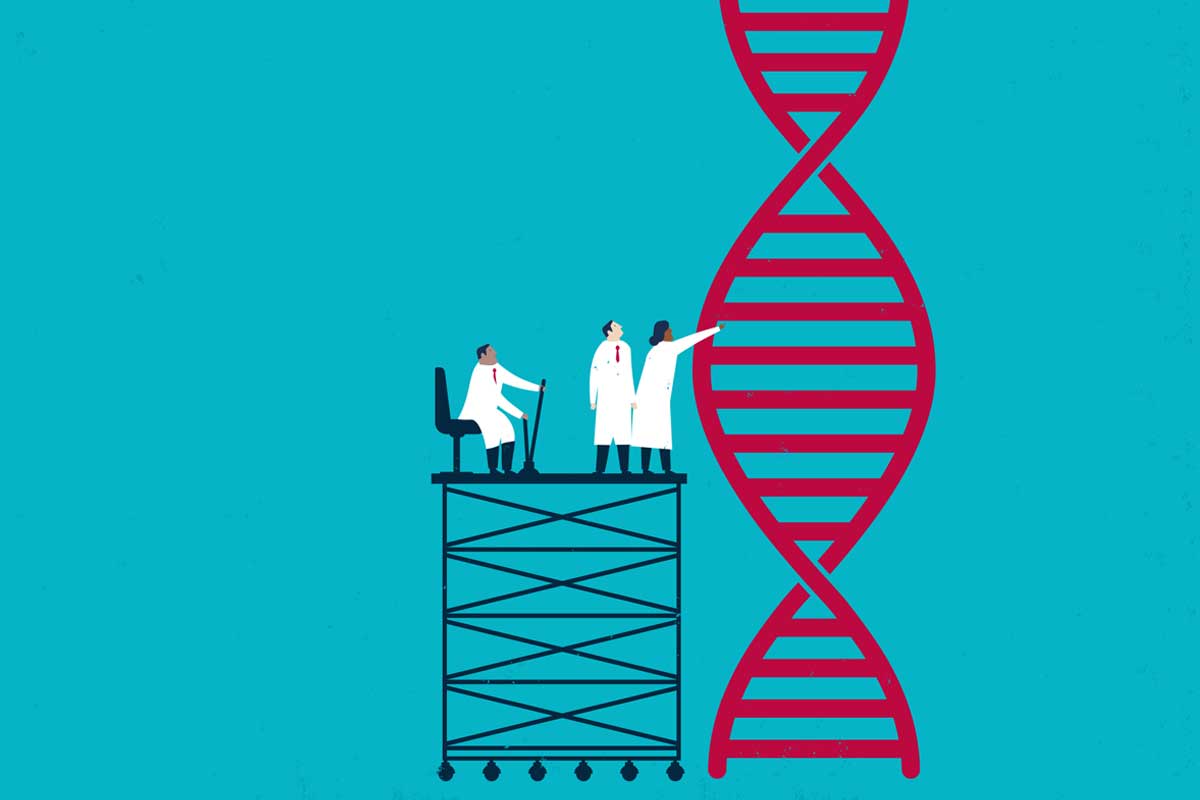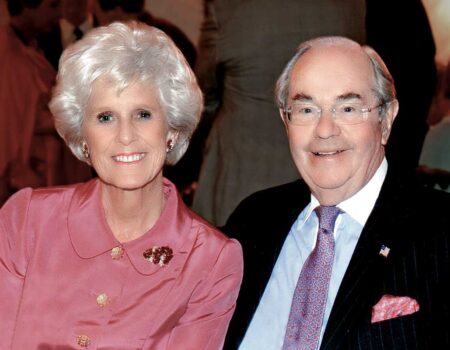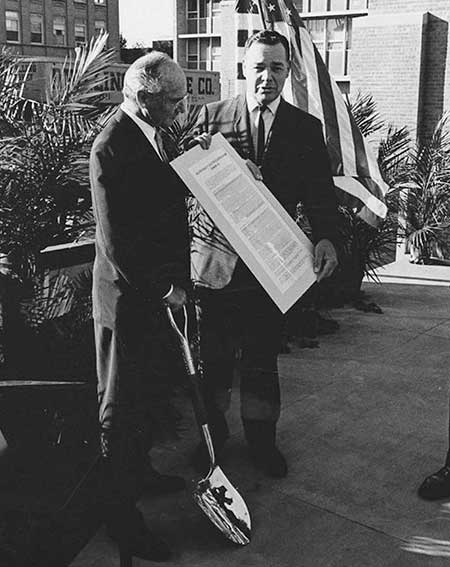
The Elizabeth H. and James S. McDonnell III Genome Institute at Washington University School of Medicine has a storied history. Founded in 1993, the institute was a leader in the international effort to decode the human genome, contributing 25% of the completed DNA sequence. Institute investigators also were the first to map the genomes of cancer patients to reveal the genetic underpinnings of their tumors.
Through these and other initiatives supported by more than $1.3 billion in research funding, the McDonnell Genome Institute (MGI) has played a key role in identifying genetic variants associated with disease and paving the way for the rise of personalized medicine.

Now, as MGI is poised to enter a new era of leadership, Elizabeth and James McDonnell, who endowed the institute with a $25 million naming gift in 2015, have stepped forward with a new pledge to provide $50 million in expendable funding. The commitment, through the JSM Charitable Trust, will accelerate plans to transform MGI that were announced earlier.
“Our vision involves bringing the institute’s massive DNA sequencing resources to bear on the challenge of integrating precision medicine into standard medical practice for all patients,” said David H. Perlmutter, MD, executive vice chancellor for medical affairs and the George and Carol Bauer Dean of the School of Medicine. “This magnanimous gift from Jim and Libby will pave the way. We are deeply grateful for their continued partnership in our efforts to expand the boundaries of genomics for the benefit of all.”
Finding disease connections
The shift in MGI’s focus is, in many respects, the result of its success in helping further the science of whole-genome sequencing and analysis. As the speed of sequencing has increased and the cost decreased over the past two decades, scientists around the world have read millions of genomes and cataloged hundreds of thousands of genetic alterations. But a significant number of these variations have no known connection to disease.
“Many are not dangerous, and some may be protective,” said Jeffrey D. Milbrandt, MD, PhD, the James S. McDonnell Professor and head of the Department of Genetics, who is leading the transformation of MGI as its new executive director. “The major task before us is to separate the genomic wheat from the chaff. We must identify which variants are important and validate their function in disease. This is critical for the advancement of precision diagnostics and therapeutics.”
Technology will play a key role in MGI’s ability to expand its expertise in the functional genomics arena. Plans call for the addition of powerful tools to enable high-throughput testing of genomic sequence variants in model biological systems, including single-cell RNA sequencing instrumentation; CRISPR genome engineering technologies; mass spectrometry for the identification of proteins and metabolites; and quantitative imaging analysis.
“The technological wizardry we have today is unparalleled,” Milbrandt said. “Twenty years ago, a multi-year, international effort first sequenced the human genome; today we can sequence the entire genome from a single cell in one day.” The McDonnells’ foresight in providing expendable funding will allow us to invest in equipment and infrastructure now, while this field is catching fire, so we can reap a powerful return later in the form of new discoveries and treatments.”
The McDonnells’ pledge also will support the recruitment of a visionary leadership team and other innovative investigators, including those who specialize in bioinformatics and computational biology. In addition, MGI will launch a master’s degree program to prepare students interested in machine learning and artificial intelligence for careers in biology and genomics.
Building powerful data sets
Of particular interest to the McDonnells, their gift will provide funding to conduct large-scale genome sequencing and analysis for patients with rare diseases and neurodevelopmental disorders at St. Louis Children’s Hospital and patients at the Alvin J. Siteman Cancer Center at Barnes-Jewish Hospital and Washington University School of Medicine. The information generated from this work, when combined with clinical information, will create rich data sets that can be mined for an array of research studies.
The McDonnells have been champions of pediatric and oncology research at Washington University Medical Center for many years. The couple lost their 2-year-old daughter, Peggy, to neuroblastoma, a common childhood cancer, in 1972.
“We believe that experts across the university working together to apply genomic approaches to cancer and other disorders will bring about a healthier world.”
– James S. McDonnell III
“My mother died of cancer, and Libby has fought it as well,” James McDonnell said. “Our experiences have motivated us to do whatever we can to fight the disease. We believe that experts across the university working together to apply genomic approaches to cancer and other disorders will bring about a healthier world.”
Two additional pilot projects under consideration will evaluate whether genomic data collected from diverse populations of St. Louis residents can be leveraged to improve health and reduce health-care costs. These longitudinal studies, which would include underserved populations, could have long-term implications for community health.
“Large-scale genomic studies to date have focused mainly on people of European ancestry,” Milbrandt said. “Our planned projects will help us broaden the reference human genome to people from all ancestries and ensure that the fruits of personalized medicine can be applied to all. We believe Washington University has a responsibility to be a leader in this area.”

Extending a family legacy
The McDonnells’ current pledge for MGI extends a family legacy of generosity that has had a significant impact at the School of Medicine, particularly in the area of genetics. James McDonnell’s father, James S. McDonnell Jr., the founder of McDonnell Aircraft Corp., which later became McDonnell Douglas, provided funding to establish the James S. McDonnell Department of Genetics in 1975. The department now ranks among the best in the country.
“The McDonnell family’s influence on the medical school and the field of genetics is extraordinary,” Milbrandt said. “They have always answered the call. Their gifts helped create a novel department, aided in the recruitment of exceptional faculty members who laid the groundwork for the university’s participation in the Human Genome Project and have extended our excellence in the area of genomics.”
Dean Perlmutter said the McDonnells’ latest commitment will enable many groundbreaking discoveries. “Jim and Libby’s gift will position our medical center as a unique leader in personalized medicine and a strong partner with our St. Louis community. Witnessing their approach to philanthropy and dedication to advancing human health has been one of the most inspiring experiences of my career.”
The McDonnells hope their pledge will jump-start MGI’s transition.“We are excited by the plans to take the institute to the next level,” said James McDonnell, a member of the School of Medicine National Council, trustee of St. Louis Children’s Hospital and of the St. Louis Children’s Hospital Foundation and member of the Children’s Discovery Institute Board of Managers. “We hope our gift motivates others to support the medical school’s efforts.”
Published in the Winter 2020-21 issue





 Share
Share Tweet
Tweet Email
Email